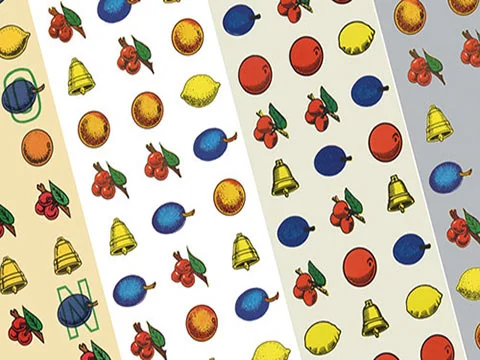How to find out the return percentage of a mechanical slot machine

How do you calculate the return percentage in winnings of a slot machine? We build our personalized slot and see the procedure.
In this post we see how it is possible to calculate the chances of a slot machine. Specifically we will see how the percentage of return to the player is calculated.
To simplify things we will use a classic 3 -range mechanical slot as an example and a single win win (central) linenull We also consider individual episodes by a unit. In practice we pretend to play one of the old and classic "Fruit Machine". The procedure cannot be applied to online slots for a complex series of reasons that would need a long dedicated discussion.
Before continuing, it is necessary to "give Caesar what is by Caesar": this article is based on a publication of the Wizardofods.com portal, which we thank for the useful ideas. We also point out that the simplicity of this machine of ours has nothing to do with the complexity of the Modern slot online, even if the bases for making the calculations still theoretically valid cone.
We are ready to start: first let's see the combinations table with relative winning of our slot:
| 3 Bar | 5000 units |
|---|---|
| 3 cherries | 1000 units |
| 3 apples | 200 units |
| 3 Anguries | 100 units |
| 3 oranges | 50 units |
| 3 lemon | 25 units |
| 2 cherries | 10 units |
| 1 cherry | 2 units |
Now Let's see how the symbols on the rollers and the number of repetitions of each of them are arrangednull For a realistic discussion, suppose that each roller has 64 positions and that only 22 of them correspond to a symbols that can generate a winning combination. The other positions correspond to white spaces without value.
| Symbol | Wheel 1 | Wheel 2 | Wheel 3 |
|---|---|---|---|
| Cherry | 3 | 2 | 1 |
| Empty space | 2 | 3 | 3 |
| Plums | 3 | 2 | 2 |
| Empty space | 2 | 3 | 3 |
| Watermelon | 3 | 3 | 2 |
| Empty space | 2 | 3 | 3 |
| Orange | 4 | 3 | 3 |
| Empty space | 2 | 3 | 3 |
| Lemon | 4 | 3 | 3 |
| Empty space | 5 | 5 | 8 |
| Bar | 4 | 3 | 1 |
| Empty space | 5 | 5 | 7 |
| Cherry | 2 | 2 | 1 |
| Empty space | 2 | 3 | 3 |
| Plums | 3 | 2 | 1 |
| Empty space | 2 | 3 | 3 |
| Watermelon | 3 | 2 | 2 |
| Empty space | 2 | 3 | 3 |
| Orange | 3 | 2 | 3 |
| Empty space | 2 | 3 | 3 |
| Lemon | 4 | 3 | 3 |
| Empty space | 2 | 3 | 3 |
| Total | 64 | 64 | 64 |
There are two interesting and curious aspects to note at this point: the wheel 1 turns out to be the most "rich", while the wheel 3 is the most poor, that is, the one in which the greatest number of whites is concentrated, making it effective more difficult to conclude the combination of 3 symbols. The other thing to note is that the largest number of white spaces is located around the bar symbol, that is, the richest. This causes a desired type of type in the real slots "I went close to us!".
Making a summary, Here is the total of symbols on each roller:
| Symbol | Wheel 1 | Wheel 2 | Wheel 3 |
|---|---|---|---|
| Bar | 4 | 3 | 1 |
| Cherry | 5 | 4 | 2 |
| Plums | 6 | 4 | 3 |
| Watermelon | 6 | 5 | 4 |
| Orange | 7 | 5 | 6 |
| Lemon | 8 | 6 | 6 |
| Empty | 28 | 37 | 42 |
Now we have all the data necessary to carry out the mathematical calculations to evaluate the return percentage of our slot. Let's see what are the probability for each winning combination, considering that we have a number of possible results of 64*64*64 = 262,144.
- 3 bar: 4*3*1 / possible results = 0.000046
- 3 cherries: 5*4*2 / possible results = 0.000153
- 3 plums: 6*4*3 / possible results = 0.000275
- 3 Anguries: 6*5*4 / possible results = 0.000458
- 3 oranges: 7*5*6 / possible results = 0.000801
- 3 lemons: 8*6*6 / possible results = 0.001099
- 2 cherries: (5*4*62 + 5*60*2 + 59*4*2) / possible results = 0.008820
- 1 cherry: (5*60*62 + 59*4*62 + 59*60*2) / possible results = 0.153778
The average return value of the slot is given by the sum of the products of each of the previous probability for the value of the winnings associated with each combination.
0.000046*5000 + 0.000153*1000 + 0.000275*200 +0.000458*100 + 0.000801*50 + 0.001099*25 + 0.008820*10 +0.153778*2 = 0.94545
In conclusion, for each episode unit, the average return percentage is 94.54%.
